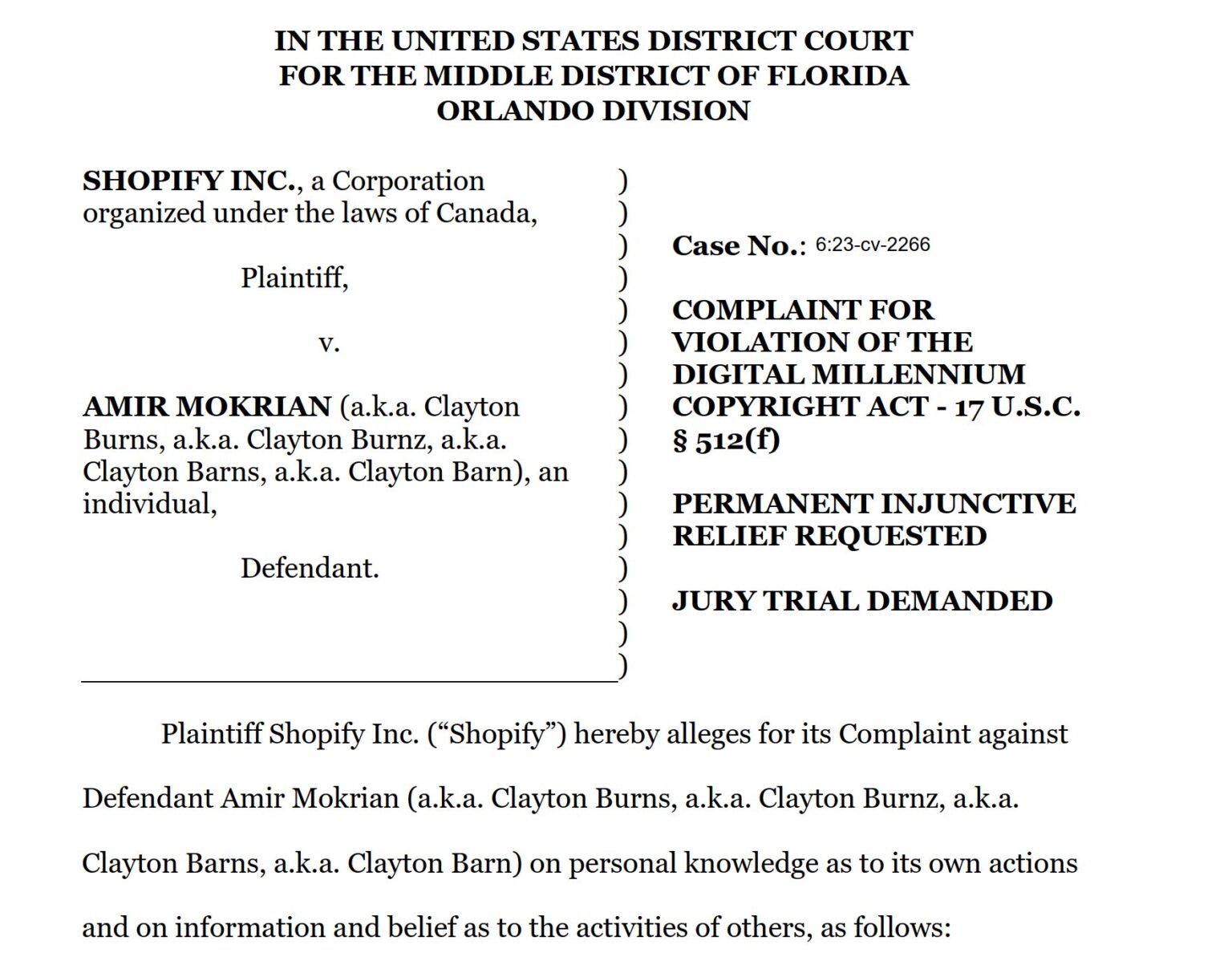At the peak of the online shopping season, Canadian e-commerce giant Shopify filed a new lawsuit to take a stand against DMCA abuse. The company filed a complaint at a Florida federal court, accusing an Orlando resident of filing dozens of false takedown notices, allegedly to advance their own commercial interests.
Signed into law a quarter century ago, the Digital Millenium Copyright Act (DMCA) aimed to equip copyright holders with new tools to protect their works online.
A key element of the law requires online service providers to remove or disable access to infringing content in response to a takedown notice.
The system isn’t bulletproof. Rightsholders repeatedly complain that their content swiftly resurfaces after it’s removed. At the same time, the takedown process is abused by bad actors to censor or remove material in bad faith.
Shopify DMCA Harassment
DMCA abuse is nothing new, but it’s rare for online platforms to take public action against it, let alone take the matter to court. In an attempt to protect its vendors, e-commerce giant Shopify is one of the rare exceptions.
Last month, we reported that Shopify had filed a lawsuit against a “John Doe” who used DMCA takedown notices to remove listings from third-party stores. According to Shopify, the senders of these takedown requests did so without owning the rights.
This alleged scammer isn’t the only one wreaking havoc on the platform. A few days ago, Shopify filed a fresh DMCA abuse complaint at a Florida federal court. This time, the e-commerce platform has a named target; Orlando resident Amir Mokrian, a.k.a Clayton Burnz.
“Defendant Mokrian has repeatedly harassed, and continues to harass, Shopify merchants and Shopify itself through knowingly false allegations of copyright infringement. This lawsuit seeks to halt that misconduct and hold him accountable for the damage he has caused,” Shopify writes.

Dozens of False DMCA Notices
Shopify informs the court that it takes copyright infringement very seriously. The company receives thousands of notices each month and regularly removes shop listings deemed to be infringing. If a store owner is repeatedly targeted, they’re at risk of having their store closed completely.
The e-commerce platform relies on a mix of both human and automated reviews to process DMCA takedowns. This works well in most cases but the process is not bulletproof, as this lawsuit exemplifies.
Using several aliases including “Clayton Burnz”, Defendant Mokrian allegedly sent dozens of DMCA takedown notices to Shopify containing false claims. These requests targeted stores selling snore-reducing mouthguards and footwear insoles over alleged copyright infringement.
However, according to Shopify, these notices were littered with false information. They didn’t include any legitimate copyright complaints but were merely intended to harm other merchants.
Taking Out Competitors
The reason for this behavior is obvious; according to Shopify, Mokrian was running competing stores. By taking out the competition, interest in their own products should rise.
“It is plain that Mokrian submitted his fraudulent DMCA takedown notices for anti-competitive purposes. TeraNue—one of Mokrian’s stores on Shopify—sells snore-reducing mouthguards. Through his takedown notices, Mokrian targeted the same or similar mouthguard products sold by competing merchants,” Shopify informs the court.
“X-Care—another Mokrian store on Shopify—sells foot insoles, the same type of product sold by Rizzsoles.com, a Shopify merchant Mokrian targeted with his false notices. Mokrian used takedown notices not in an effort to root out copyright infringement, but in an effort to root out competition.”

One of Mokrian’s stores
Shopify ended up removing 38 competing products based on these false takedown claims. While these decisions were ultimately reversed, serious harm was done to both the affected shops and the platform itself.
The complaint notes that Shopify was financially impacted by the abuse. The company spent tens of thousands of dollars in personnel time and resources to address the issue. In addition, its goodwill was seriously harmed.
Through the lawsuit, Shopify hopes to be compensated for its losses. In addition, the company asks the Florida court for an injunction against the Orlando resident, prohibiting them from sending any fraudulent DMCA notices going forward.
—
A copy of the complaint Shopify filed at the U.S. District Court for the Middle District of Florida is available here (pdf)



3175x175(CURRENT).thumb.jpg.b05acc060982b36f5891ba728e6d953c.jpg)

Recommended Comments
There are no comments to display.
Join the conversation
You can post now and register later. If you have an account, sign in now to post with your account.
Note: Your post will require moderator approval before it will be visible.